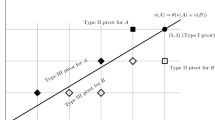Abstract
Oligarchic majority rules bring the voice but no vote principle into effect. We prove characterizations of the oligarchic majority rules for both fixed and unrestricted societies and a binary agenda. This is a general class of rules that includes the simple majority rule as well as dictatorships. Suitable sets of axioms identify a subsociety whose members have voice but no vote, and valid votes are aggregated by the majority rule.
Similar content being viewed by others
Notes
Woeginger (2005) refers to biased voters. Still other authors write concerned voters instead.
If no confusion is possible, we simply drop the reference to the social welfare function F and say that the profile is irrelevant-free.
Another counterexample is the “unanimity” rule that declares \(F(R)=0\) when \(R\ne (1, \ldots , 1)\) and \(R\ne (-1, \ldots , -1)\); \(F(1, \ldots , 1)=1\); and \(F(-1, \ldots , -1) = -1\). Observe that when \(n=2\), \(F(1,1)\ne F(F(1,0), F(0,1))\) therefore RI is not satisfied.
Miroiu (2013) gives an exhaustive analysis of responsiveness properties (like AR and PR) which can be used to prove similar characterizations of the majority rule.
References
Alcantud JCR (2019) Yet another characterization of the majority rule. Econ Lett 177:52–55
Aşan G, Sanver R (2002) Another characterization of the majority rule. Econ Lett 95:409–413
Aleskerov FT (1999) Arrovian aggregation models. Kluwer Academic Publishers, Boston
Bartholdi L, Hann-Caruthers W, Josyula M, Tamuz O, Yariv L (2019) Equitable voting rules. arXiv:1811.01227v2 [econ.TH]
Campbell DE, Kelly JS (2013) Anonymity, monotonicity, and limited neutrality: selecting a single alternative from a binary agenda. Econ Lett 118:10–12
del Valle S (2003) Language rights and the law in the United States: finding our voices. Multilingual Matters, Clevedon. ISBN-10: 1853596450
Fishburn PC (1983) A new characterization of simple majority. Econ Lett 13:31–35
García-Lapresta JL, Llamazares B (2010) Preference intensities and majority decisions based on difference of support between alternatives. Group Decis Negot 19:527–542
Gibbard AF (2014a) Social choice and the Arrow conditions. Econ Philos 30(3):269–284
Gibbard AF (2014b) Intransitive social indifference and the Arrow dilemma. Rev Econ Des 18:3–10
Isaacs IM (2008) Finite group theory. Graduate studies in mathematics, vol 92. American Mathematical Society, Providence
List C (2013) Social choice theory. In: Zalta EN (ed) The stanford encyclopedia of philosophy (winter 2013 edition) https://plato.stanford.edu/archives/win2013/entries/social-choice/
Llamazares B (2006) The forgotten decision rules: majority rules based on difference of votes. Math Soc Sci 51:311–326
May K (1952) A set of independent, necessary and sufficient conditions for simple majority decision. Econometrica 20:680–684
Miroiu A (2004) Characterizing majority rule: from profiles to societies. Econ Lett 85:359–363
Miroiu A (2013) Responsiveness axioms and the majority rule. Econ Bull 33(1):740–746
Quesada A (2010a) Monotonicity + efficiency + continuity = majority. Math Soc Sci 60:149–153
Quesada A (2010b) Two axioms for the majority rule. Econ Bull 30(4):3033–3037
Quesada A (2013) The majority rule with arbitrators. Group Decis Negot 22:321–330
Weymark JA (2014a) An introduction to Allan Gibbard’s Harvard seminar paper. Econ Philos 30(3):263–268
Weymark JA (2014b) An introduction to Allan Gibbard’s oligarchy theorem paper. Rev Econ Des 18:1–2
Woeginger GJ (2003) A new characterization of the majority rule. Econ Lett 81:89–94
Woeginger GJ (2005) More on the majority rule: profiles, societies, and responsiveness. Econ Lett 88:7–11
Xu Y, Zhong Z (2010) Single profile of preferences with variable societies: a characterization of simple majority rule. Econ Lett 107:119–121
Young HP (1974) An axiomatization of Borda’s rule. J Econ Theory 9:43–52
Acknowledgements
The author is grateful to the Coordinating Editor and two anonymous reviewers for their very valuable comments, which improved the quality of the paper. The author thanks audiences of the ASSET 2018 conference in Firenze, and seminar presentations in Valladolid and Catania.
Author information
Authors and Affiliations
Corresponding author
Additional information
Publisher's Note
Springer Nature remains neutral with regard to jurisdictional claims in published maps and institutional affiliations.
Rights and permissions
About this article
Cite this article
Alcantud, J.C.R. Simple Majorities with Voice but No Vote. Group Decis Negot 29, 803–822 (2020). https://doi.org/10.1007/s10726-020-09663-5
Published:
Issue Date:
DOI: https://doi.org/10.1007/s10726-020-09663-5




